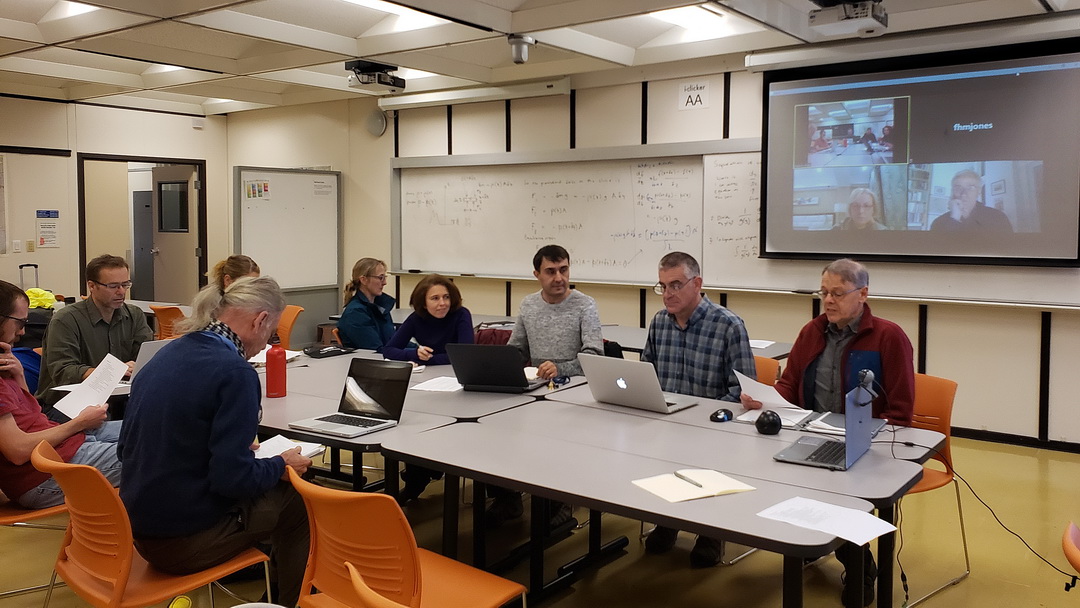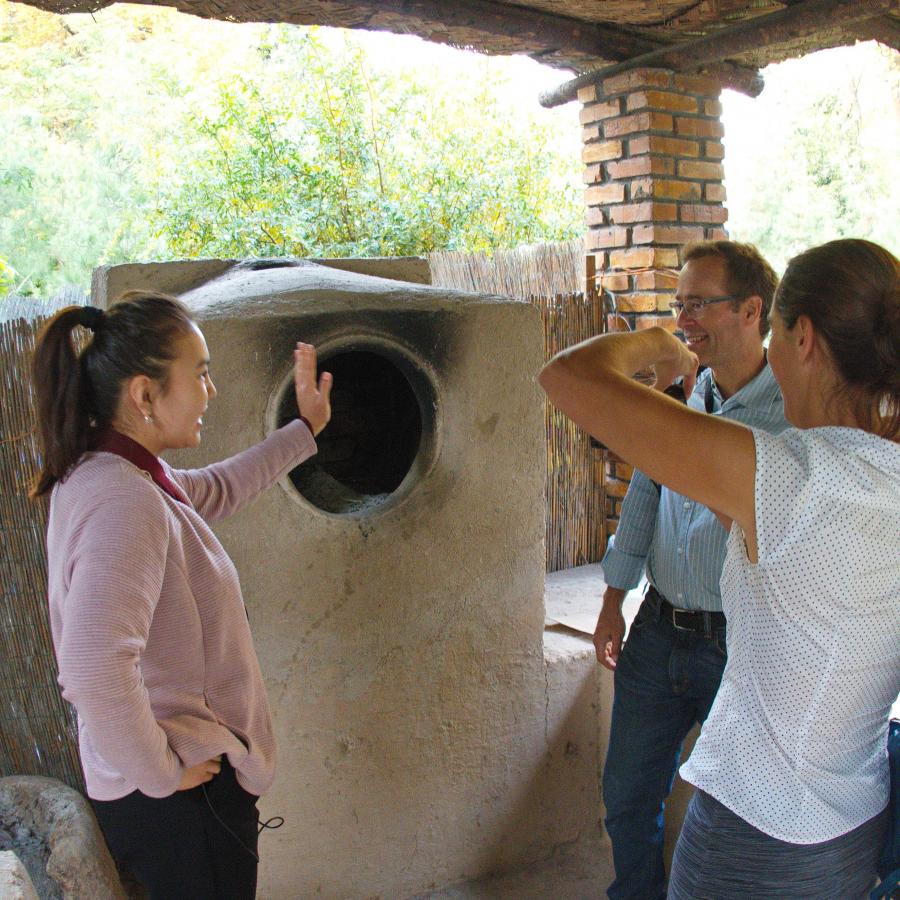It’s not often academics get the chance to create a brand new degree program for a brand new university. That was both the opportunity and challenge when UBC signed an international cooperation agreement with the just-opened University of Central Asia (UCA) in 2017. The task: developing curriculum for UCA to be taught at their Khorog, Tajikistan campus in the remote Pamir mountains across the Panj River from Afghanistan.
UBC’s contribution involved creating a complete 22-course curriculum for UCA’s new B.Sc. program in Earth and Environmental Sciences. The courses had to be consistent and transferable, representing a cohesive science degree in a liberal arts setting with a focus on mountain societies and sustainability in the local Central Asian context.
Francis Jones, a lecturer in UBC’s Department of Earth, Ocean and Atmospheric Sciences (EOAS), managed the project with support from Dr. Loch Brown in UBC’s Geography department. The team included 11 part-time course developers in EOAS, Geography, Physics, Ecology and Chemistry, UCA faculty in Central Asia and an international team of course reviewers chosen by UCA. UBC students also contributed, including Fatima Mannapbekova, who presented a poster at the 2018 World Mountain Forum in Bishkek, Kyrgyzstan. The EOAS and Geography department heads at the time – Dr. Roger Beckie and Dr. Marwan Hassan – proved instrumental in the project’s success.
A new university is born
The Panj river separating Afghanistan (right) from Tajikistan (left) runs near UCA’s Khorog campus in the Pamir mountains of Tajikistan (photo: Francis Jones)
Founded in 2000 as a non-profit, private and secular English-language university, UCA is an ambitious new institution initiated by His Highness the Aga Khan, 49th hereditary Imam of the Shia Ismaili Muslims, with support from the Aga Khan Development Network, as well as numerous international academic and institutional partners. The basis is an International Treaty involving the Kyrgyz Republic, Tajikistan and Kazakhstan. The institution is also registered with the United Nations. UCA has three new rural residential campuses, one in each partner nation and also in the vicinity of the historic Silk Road trading routes. The first undergraduates hailing from diverse backgrounds started their studies five years ago, launching into a degree track after a one-year bridging program developed by Toronto’s Seneca College and taught at UCA.
Global partners see the 1st class graduate
UCA students take UBC team members on a tour of the brand new campus in Khorog, Tajikistan (photo: Francis Jones)
After 20 years of institutional development by UCA, two years of course development at UBC and five years of study, the first UCA students to complete their B.Sc. degree in Earth and Environmental Sciences graduated in June 2021.
A once-in-a-career opportunity
The new UCA campus in Khorog (pink and yellow buildings), as seen from the Pamir Botanical Gardens (photo: Francis Jones)
“It was so exciting to build a degree from scratch, to have a clean slate and the freedom to develop a truly unique program that bridges social and natural sciences, and one focused on the key issues facing the region. The UBC-UCA partnership set out to create a new and innovative program that would empower a new generation to meet the environmental challenges of today and tomorrow. You just don’t get a chance like that very often!”—Dr. Loch Brown, associate professor of teaching in UBC’s Geography department
UCA ahead in delivering curriculum
Fundamental in UCA’s world-class educational aspirations are modern facilities and evidence-based pedagogies (photo: Francis Jones)
“Them coming to us to provide expertise to kickstart a whole new institution was mind-boggling. Though this is a university in a developing nation and challenging location, they are really committed to delivering their curriculum using the best possible evidence-based teaching and learning practices.”—Francis Jones
Key factors: time + communication
Collaborating with international partners from UBC to the U.S., Europe and Central Asia meant learning to run remote meetings long before COVID-19 (photo: Francis Jones)
“Consider how much time it’s going to take and at least double it. It’s because of all those moving parts: you might start off down one pathway and that path changes. Also important is pushing the communication side of things. It’s easy to lose that and then lose your track.”—Dr. Lucy Porritt, geology specialist and lecturer at UBC in the Department of Earth, Ocean and Atmospheric Sciences
Opportunities for under-served students
State-of-the-art residential and learning facilities at UCA’s Khorog campus (photo: Francis Jones)
“UCA selects students, mostly from smaller towns and rural regions, on the basis of merit: 80 percent come from Central Asia and 20 percent from adjacent regions. Funding supports those who need it and students thrive in the gender-balanced, secular, English-language environment.”—Francis Jones
Contextual considerations
Sharing the main and only highway between Khorog and Tajikistan’s capital, Dushanbe (photo: Francis Jones)
“We felt like this was an opportunity to do something meaningful, and very powerful, for the region. Context was key. We mixed a human perspective with an earth sciences mindset and Central Asian issues. For example, we incorporated the impacts of climate change on pastoral ways of life, local environments and the people living there. These impacts are clear and occurring now in mountain communities, which are seeing them before anyone else. They are like the proverbial canary in a coal mine.”—Dr. Loch Brown
Field trips are key
Vendors at a local market in Khorog, Tajikistan (photo: Francis Jones)
“From Square One, an important part of our proposal was for partners to visit each other in their settings. First, to gain appropriate perspectives and establish strong relationships between UCA and UBC staff and faculty. Second, to learn about the geological, geographical and cultural context of this incredibly rugged land. The natural setting and thousands of years of history are critical components in ensuring a complete and empowering education about Earth and the environment, and a rigorous yet relevant curriculum. Members of the UBC team experienced field trips into communities, homestays in villages and explored the local geological settings, while our Central Asian partners came to Vancouver to collaborate on course development and see UBC’s educational practices in action.”—Dr. Lucy Porritt
A missing puzzle piece: follow-up
Because mountainous rural communities feel environmental and climate-related challenges most acutely, their experiences are critical to learning about earth and environmental sciences in these regions (photo: Francis Jones)
“Partnership arrangements need resources to do follow-up – I think what’s often missing is that reflective step. We don’t really know how our courses worked; we’ve had minimal feedback and would like to reconnect.”—Dr. Lucy Porritt
Expanding UBC’s role
Learning about the ancient, still current, ways of baking bread (photo: Francis Jones)
The UBC development team believes that UBC, being at the forefront of science education teaching practices, has an opportunity to contribute expertise about post-secondary education and how it works: to serve the international community and support emerging academic institutions. For example, Dr. Linda Strubbe, who was a UBC physics science education specialist at the time, built UCA’s new introductory physics course explicitly for Earth and Environmental Sciences students, and then went on to support UCA’s faculty professional development activities.
“UBC is now allowing a one-semester sabbatical for lecturers, which is really exciting. I see myself going abroad as a lecturer to learn how others teach.”—Dr. Lucy Porritt
Read about the University of Central Asia.
Find out more about UBC’s Department of Earth, Ocean and Atmospheric Sciences.
Find out more about UBC's Department of Geography.
See the project blog for progress, personnel and thoughts from UBC student contributors.
Watch the video about the new Earth and Environmental Sciences B.Sc. degree at UCA’s Khorog campus: